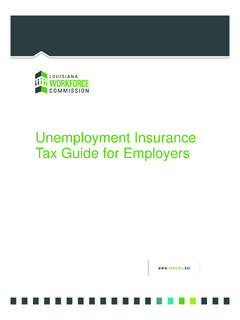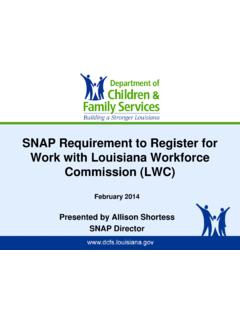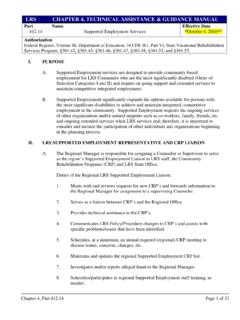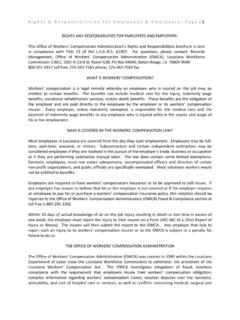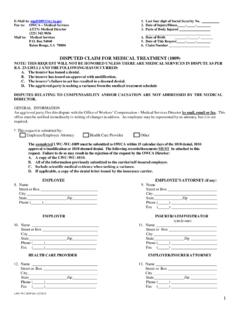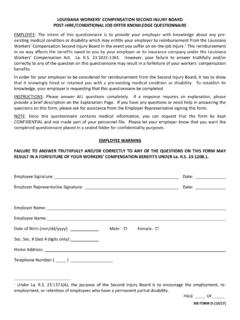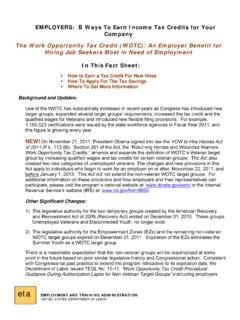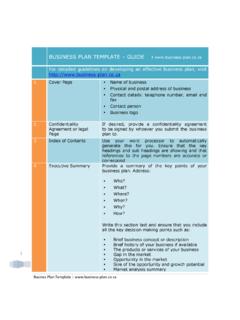Transcription of CHAPTER 4: LRS TECHNICAL ASSISTANCE & …
1 CHAPTER 4, Part 414 Page 1 of 5 Federal regulations require that the State Agency assume responsibility for placement of all job-ready consumers receiving vocational rehabilitation services. The LRS Counselor and/or the LRS Rehabilitation Employment Development Specialist (REDS) are the primary agents to carry out this responsibility. I. SECURING SUITABLE EMPLOYMENT Securing suitable employment involves developing, with the consumer, a comprehensive program for placement. This program usually includes one or more of the following: A. The consumer is informed of specific job openings. B. Employers are contacted. C. The consumer is registered with the Louisiana Workforce Commission s Career Solution Center. The Counselor should complete the WOTC Conditional Certification Form (ETA 9062) at this time. D. Adequate provision is made for post-employment follow-up. E. The Counselor arranges for utilization of marketing approaches to job placement, such as referring the consumer to the Job Opportunities Workshop.
2 F. The Counselor provides individualized job seeking skills counseling to assist the consumer with job placement. G. The Counselor refers the consumer to the Rehabilitation Employment Development Specialist for direct placement ASSISTANCE . NOTE: Merely advising a consumer to "watch the want ads" or "to look around for a job opening" is not a substantial job placement service. *II. PROGRESSIVE EMPLOYMENT OPTIONS (PEO) Job placement refers to those activities that will lead to employment of consumers that is consistent with their unique strengths, resources, priorities, concerns, abilities, capabilities, interests, and informed choice. Placement services are provided to eligible consumers in assisting them to prepare for, secure, and maintain employment. The placement of consumers must occur in the most integrated setting possible before they can be considered rehabilitated. Through Progressive Employment Options, consumers with significant disabilities who are eligible for vocational rehabilitation services will be provided employment-related services that may include job readiness, a company tour, job shadowing, work experience, and custom solutions.
3 LLRRSS CCHHAAPPTTEERR 44,, TTEECCHHNNIICCAALL AASSSSIISSTTAANNCCEE && GGUUIIDDAANNCCEE MMAANNUUAALL Part 414 Name Job Placement Effective Date *July 16, 2013** Authorization Federal Register, Volume 66, Department of Education, 34 CFR 361, Part VI, State Vocational Rehabilitation Services Program, , and CHAPTER 4, Part 414 Page 2 of 5 Job Readiness: Service needed to prepare a consumer to obtain and maintain employment. May include but is not limited to soft skills training, work ethic training, or any of the following: A. Company Tour: Involves a one or two hour visit to a job site and meeting with an employer. It can provide a real-world understanding of the workplace and the skills needed to be successful. B. Job Shadowing: Usually 1-3 days duration and 1-3 hours per day. It is a way for employers and potential candidates to meet without making a hiring commitment. This is an opportunity for individuals to get a hands-on understanding of the business and a sense of the employer s expectations and work environment.
4 (See CHAPTER 5, Vendor) C. Work Experience: Usually 1-6 weeks duration (flexible). It is for individuals who meet many skill requirements of the job, but need additional training. It provides an opportunity to introduce a candidate to the workforce prior to actually making a hire. (See CHAPTER 5, Vendor) D. Custom Solutions: Develop custom solutions and strategies to help employers address their unique or changing staffing needs using the progressive employment training options available.** III. WORK OPPORTUNITY TAX CREDIT (WOTC) The Work Opportunity Tax Credit (WOTC) is one tool in a diverse toolbox of flexible strategies designed to help move people into gainful employment and obtain on-the-job experience. Refer to website: A. Employer Benefits 1. The employer is eligible for a tax credit based on qualified wages paid to the employee for the first year of employment. The credit is 25% of qualified first year wages for those employed at least 120 hours but fewer than 400 hours and 40% for those employed 400 hours or more.
5 2. The employer may not claim wages reimbursed by LRS while a consumer is in On-the-Job Training. However, the amount of time a consumer works while in OJT can be used to satisfy the conditions of or 2. below. CHAPTER 4, Part 414 Page 3 of 5 B. Targeted Group A Vocational Rehabilitation consumer is considered a member of one of the targeted groups if the consumer: 1. Has been determined eligible for vocational rehabilitation services; and 2. The consumer is seeking employment upon completion of (or while receiving) rehabilitation services pursuant to an IPE. C. Special Rules for Certification 1. The Counselor must complete a WOTC Conditional Certification Form (ETA 9062) and make 2 copies. A copy of this form is placed in the consumer s case record folder and a copy is mailed to the Louisiana Workforce Commission at the address shown on the form. The original is given to the consumer. 2. The WOTC Conditional Certification Form (ETA 9062), along with an IRS Form 8850, is given to the consumer (applicant).
6 The employer and the consumer must complete the IRS Form 8850. An IRS Form 8850 must be completed by an employer on each WOTC eligible consumer and it must be completed on or before the job offer date. 3. The Counselor must instruct the employer to attach the IRS Form 8850 to the Conditional Certification Form and mail it (within 21 calendar days after the WOTC eligible consumer starts work) to the Louisiana Workforce Commission address on the WOTC Conditional Certification Form. D. Minimum Employment Period 1. The consumer must maintain employment at least 180 days; or 2. Complete at least 400 hours of services for the employer. E. Maintenance of Records 1. As a part of the WOTC reporting procedures, the Louisiana Workforce Commission must count the number of Conditional Certifications completed by each issuing agency and by target group. Therefore, the Regional Manager must ensure that the following guidelines are in place: a. The Counselor or Counselor s Associate must make two (2) copies of the ETA 9062.
7 The original is given to the applicant, and one copy is maintained in the consumer s case record. b. The second copy is placed in a temporary file. On a weekly basis, a regional office employee must batch all of the second copies and mail to the following address: CHAPTER 4, Part 414 Page 4 of 5 LWC - WOTC Processing Unit P. O. Box 94094 Baton Rouge, Louisiana 70804-9094 IV. COUNSELOR S READY REFERENCE GUIDE FOR JOB PLACEMENT A. Direct Job Placement - (Broad Definition) Counselor involvement with consumers who are job ready. The Counselor assists consumers in their job search and does not pay a provider. The degree of involvement will depend on the individual consumer needs. B. Counselor involvement should be documented in AWARE Case Notes and can include, but is not limited to, the following: 1. Meet with the consumer when he/she is nearing completion of training, or when he/she is job ready and is prepared to begin his/her search. Remind the consumer that looking for a job is a full time job in itself, and he/she will probably not get the first job for which he/she applies.
8 2. The majority of consumers will need a resume. Review the consumer s resume to ensure it reflects the consumer s abilities and is targeted for the job sought. Many employers will request a resume to review prior to scheduling an interview. Some consumers will already have one completed. 3. If the consumer does not have a resume, there are templates the consumer can use to complete a resume . The Louisiana Workforce Commission has handouts on completing resumes and cover letters; inform the consumer of this resource. 4. The consumer should have a cover letter if he/she intends on leaving a resume or mailing a resume to a potential employer. 5. Discuss the consumer s knowledge of the job market. Does the consumer have a list of employers who hire for the positions he/she is applying for? Does the consumer know where to begin to seek out employers? 6. Discuss accommodations with the consumer. Will the consumer need assistive technology or accommodations to perform the job for which he/she is applying?
9 If the Counselor and the consumer know what the consumer will need, and how it can be provided to an employer, this will remove a potential barrier. The Counselor needs to be involved at this stage. Possible accommodations should be researched prior to the consumer seeking employment. 7. Have the consumer register with a Business & Career Solutions Center. Job openings are also listed on the Louisiana Workforce Commission web site . A Business & Career Solutions Center can refer consumers to positions for which they qualify. Remember, many employers request a resume prior to scheduling an interview. CHAPTER 4, Part 414 Page 5 of 5 8. Ensure the consumer understands the value of networking. The consumer should contact everyone he/she knows, and let the contact know that he/she is looking for employment. The majority of jobs are filled through contacts; many jobs are never advertised. 9. Network with other Counselors and Agency personnel. Share job openings in the area with other Counselors.
10 Someone may have a consumer looking for a particular position. 10. Discuss work ethics, such as: consumers being early for interviews and prepared. Many employers are looking for employees who will just show up, be on time, and have a decent attitude. Understanding the value of good work ethics is important for the consumer. 11. Discuss interview skills. Give the consumer a list of most commonly asked interview questions. The consumer should prepare responses and be ready to answer questions. The consumer should evaluate his/her own strengths and weaknesses and to be prepared to present a positive image. 12. Ensure the consumer understands what clothes are appropriate for the interview. Discuss transportation and childcare issues. 13. Maintain contact with the consumer during the job search. Some consumers may want the Counselor to go with them to interviews and others may not. Allow the consumer to decide. 14. Complete the WOTC tax credit forms.
